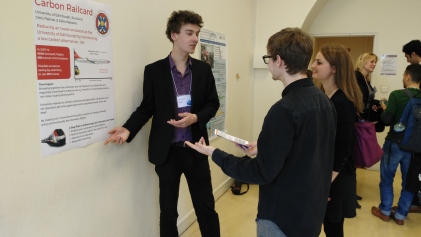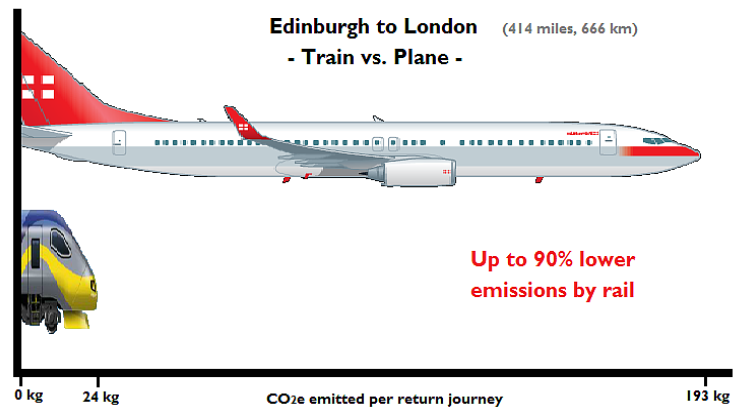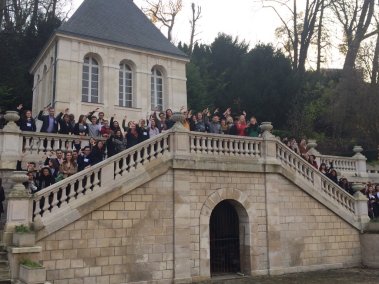
Our morning melting – uh sorry, meeting – place. Yes, these are real pieces of iceberg.
Nine months after CGI U in Miami, Chris and Celia got invited to present the Carbon Railcard project in Paris at the Global University Climate Forum.
This forum was organised by the International Alliance of Research Universities (IARU) in collaboration with the International Sustainable Campus Network (ISCN) of which the University of Edinburgh is a member.
The GUC Forum (let’s call it by its sexy nickname) took place in Paris, in the context of the Global Climate Change summit, COP21, currently unfolding a few kilometres away. About 60 students from all five continents were invited to come and present a project they are setting up on their campus, listen about each others’ projects and network. Although Chris and I graduated this past summer, we are both still living in Edinburgh and not feeling quite grown up yet, so we applied to attend the GUCF and were successful.
The Carbon Railcard project, as a reminder, is the project Chris presented in Miami (cf. the 2015 projects on this website). In a nutshell, this project aims to tackle the UoE’s carbon footprint by addressing the GHG emissions generated by staff’s business travel.

Emissions from business travel (staff going to conferences, various meetings, and conducting research abroad), in particular air travel, are the elephant in the room. They are a considerable chunk (approximately 10%) of the University’s emissions; yet, not included in any mitigation strategy. Of course, we can’t forbid professors from flying to events on other continents; but what we can do is incentivise them to choose the train over the plane as much as possible, especially within the UK. The Carbon Railcard project facilitates collaboration between rail operators and the university and aims to reach an agreement where the rail operator would offer an incentive, like free Wi-Fi, a discount or a loyalty points system, and in return would hopefully gain more passengers. It’s a win-win. Taking the train over the plane can reduce journey emissions by 90%.

Today is aviation day at COP21 (very interesting article about it here). Politicians are slowly beginning to recognise that the aviation sector is a significant challenge to climate change mitigation. The sector contributes only 2-3% of global GHG emissions, but it is booming. Yet, the solutions presented by scientists and businesses – technological innovation to make planes more efficient – are falling short of the real problem: if we are to limit global warming to 2°C, we will need to fly less. You can find more information about the context and environmental problems of the aviation sector in this very good article of The Economist (here).
In the GUC Forum, we did not only talk about air travel. Many projects addressed students’ awaren ess and knowledge of climate change and environmental sustainability. Some intended to raise awareness, others to engage students actively and yet others to embed sustainability in the curriculum. Other important issues that came in the spotlight too included food surplus and waste on campus, Cambridge’s investment policy (two – surprisingly unrelated – teams of students campaigning for “positive investment” showed up), biodiversity in and around campus, renewable energy, and environmentally friendly behaviours. At the end of the day, everyone’s impression of the day was positive: so much energy, optimism, ambition! For us, it was extremely motivating and inspiring to meet and exchange with other young people who believe that change for the better is possible and that we all can be part of it.
ess and knowledge of climate change and environmental sustainability. Some intended to raise awareness, others to engage students actively and yet others to embed sustainability in the curriculum. Other important issues that came in the spotlight too included food surplus and waste on campus, Cambridge’s investment policy (two – surprisingly unrelated – teams of students campaigning for “positive investment” showed up), biodiversity in and around campus, renewable energy, and environmentally friendly behaviours. At the end of the day, everyone’s impression of the day was positive: so much energy, optimism, ambition! For us, it was extremely motivating and inspiring to meet and exchange with other young people who believe that change for the better is possible and that we all can be part of it.
Finally, we also had the incredible opportunity to hear from, and discuss with, experts. Prof. Le Treut and Prof. Jobert, from the prestigious French Universities Pierre et Marie Curie and Paris-Sorbonne, respectively; and Prof. Kammen from the Energy and Resource Group and the University of California Berkeley listened to some of the presentations and shared with us their expertise and insights from their professional experience in academia and politics. Throughout the day, three more experts joined us and talked with the various student groups about their projects. At the end of the day, they (Prof. Ivanova and Dr. Cash from University of Massachusetts Boston, and Ms. Harris from the ISCN) gave us feedback and engaged in discussion with all of us.
In short, this Forum was an exciting day of exchanges, new friendships, and learning. We will be going back to Edinburgh (not flying, of course) with renewed energy to make this project happen! If you wanted to get involved, don’t hesitate to get in touch with Chris.
Salutations de Paris,
Célia and Chris
Well done both of you (Celia – also really liked your CAP post. Can you link it to pachamama?) EB